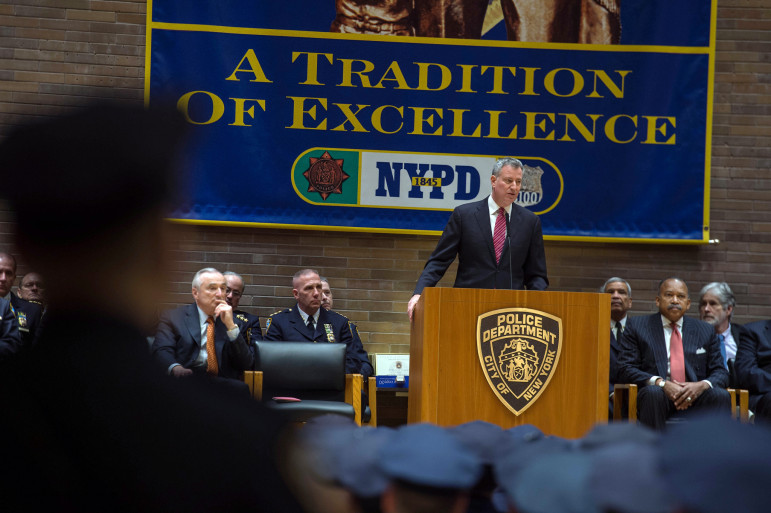
Demetrius Freeman/Mayoral Photography Office.
Mayor Bill de Blasio Delivers Remarks at NYPD Promotions Ceremony. Friday, December 19, 2014
Mayor de Blasio’s troubles with the police unions didn’t start in the grief-stricken hallway of Woodhull Hospital on Saturday night, or earlier this month when a Staten Island grand jury revealed it would not indict the police officer involved in the fatal takedown of Eric Garner, or even after Garner’s July death.
They date back to the 2013 mayoral campaign when de Blasio supported the creation of an inspector general and made overpolicing a linchpin critique in his campaign. They involve everything from Rachel Noerdlinger to pot arrests. And the dust-ups over policing policy can’t be fully separated from the on-going talks around a much-delayed labor settlement for police officers and sergeants.
All that is to say that understanding that relationship between the mayor and the police union requires more than looking at what the mayor said publicly and recently.
But given the steep rise in discord over just the past few weeks, it’s worth looking at exactly what the mayor said about the police between the evening the Garner grand jury spoke (December 3) and the afternoon when the brutal slaying of two cops happened in Brooklyn (December 20).
The excerpts below reflect the spirit of each episode. But the bolded headlines below link to full transcripts of the mayor’s remarks in each case, which are worth reading to get all the nuance of each encounter:
December 19 speech to NYPD promotion ceremony:
I want you to know I hear this from national leaders. I hear this from mayors around the country, police leaders around the country. There is a respect, in some cases, even awe at what this department has done in recent weeks. Because in difficult moments in our history, it takes tremendous skill, it takes wisdom, it takes great strategic capacity, it takes strength, it takes discipline to protect our democratic values while making sure there is no violence and disorder. You’ve done that. You’ve done that and that is not easy, but you’ve done it, day in and day out.
After a meeting with the Justice League, December 18:
I made very clear that we cannot accept any violence against our police officers or against anyone. And they were very quick to affirm that they were appalled equally by the events on Saturday night. They find it unacceptable and they will work with the police to identify anyone who seeks to harm the police or harm anyone and undermine their non-violent peaceful progressive movement. So I thought there was real unity on that point. They have a list of demands, some of which I agree with, some of which I don’t – we had a very honest conversation about that – but what I appreciate is, they are respectful of the democratic process.
Press conference, December 17:
… we think they must denounce violence. I think everyone has to denounce violence against police officers. Look, this is so fundamental – and I said it on a nationally televised program yesterday. The – you cannot talk about social change and then commit an act of violence against a police officer. It makes no sense, it denigrates the cause, it undermines the legitimacy, it’s illegal, it’s wrong, it’s immoral – you could go down the whole list. I would say this to any protester anywhere – respect the police, listen to their instructions, work with them. If someone in your midst discusses the potential of attacking the police, you have to turn that person in. You have to help the police stop that.
Press availability, December 15:
On the topic of the incident on the Brooklyn Bridge on Saturday night, I want to make clear that we saw, over these last days, what we should’ve seen in the vast majority of cases – peaceful protests – in fact, tens of thousands of people participating peacefully, exercising their democratic rights. I have said repeatedly how much I admire and appreciate the efforts of the NYPD to manage that protest appropriately. I think it’s been a brilliant effort by the NYPD.
In the vast majority of instances, there was no violence, there were no altercations, there were limited arrests. What happened on Saturday night on the Brooklyn Bridge was fundamentally unacceptable. Of course, there will always be due process, and so events are alleged until we have all the facts. But what we believe we know is that individuals attacked our police officers in an entirely inappropriate and unacceptable way – and that won’t be tolerated. It’s as simple as that. And not only will it not be tolerated by me, it will not be tolerated by the NYPD. I want to speak directly to those who are protesting.
I’ve spent plenty of years involved in efforts for social change. I’ve been to my share of protests. It is incumbent upon all those who are protesting to set a high standard, to respect the police who have done such a fine job of protecting them and working with them, and to stop any potential act of violence. It is up to the protestors to join the effort to keep the peace.
Statement on the protests, December 13:
Over the past several days, the people of New York have provided an example to the world on how to protest, march and express themselves in a peaceful and respectful manner. However, an incident today on the Brooklyn Bridge, in which a small group of protestors allegedly assaulted some members of the NYPD, marks an ugly and unacceptable departure from the demonstrations thus far. Let us be clear: there is no place whatsoever for violence of any kind, whether against the police or against our fellow citizens, in New York City. The people of New York should be proud for how they have made their voices heard over these past several days, and the men and women of our police force should be commended for the professionalism, dedication and restraint they have displayed throughout these marches. We will not allow a small contingent of agitators to bring disorder and violence to these protests. Those who reject peaceful protest and provoke violence can expect immediate arrest and prosecution. Such acts are beneath the dignity of New York City, they undermine the very values these protests are working to advance, and they simply will not be tolerated.”
Comments in Crown Heights, December 11:
Question: How is the city going to show the world that we respect our police, and actually take care of ourselves, and show the whole world that we’re united and not divided?
Mayor: Well, I think this has been, actually, a proud time for New York City’s last weeks, as our police have done an extraordinary job keeping us safe. You know, we’re very, very proud of the fact that, as this year has progressed, New York City has gotten safer and safer. But even in an atmosphere where there’s been a very intense debate over a host of important issues, the NYPD has really functioned as a force that helps everyone express their views peacefully, appropriately, and keeps order at the same time. And the –
Question: That’s correct, but —
Mayor: And – but let me just finish – the whole nation’s been watching that.
Question: Right —
Mayor: And I think New Yorkers should be very proud of the fact that the NYPD has handled everything so gracefully in these last weeks.
I’ve said a number of times, the history and progress on bringing down crime is a 20-plus year achievement in this city. And a number of administrations deserve credit – in terms of mayors, a number of different police commissioners, and certainly the City Council, which played an early role in making sure the resources would be there, the state legislature, and most importantly – of course – the men and women of the NYPD working with community residents. So, this is a big, consistent, historical pattern, where each achievement has to be built on by the next.
What is often left out of the discussion is the fact that Mayor Dinkins and Speaker Vallone put together the Safe Streets, Safe City package, went to Albany – it was not an easy thing to achieve – they got a dedicated tax to add police officers at a time when we desperately needed that to turn around the dynamics. Anyone who was here in the early 90s will remember just how difficult the situation was. And that was one of the foundational acts – maybe the most foundational act – in the turnaround on crime in this city, for the later administrations benefitted from those resources and helped to consolidate the gains.
I think something all New Yorkers should be proud of today is the way the NYPD handled this incident. In the dead of night, something absolutely unexpected – the responding officers handled things, from everything we’ve seen so far – again, there is an investigation, but I’m going to speak as someone who’s seen the video and just offering my own common-sense assessment – the officers responded with great restraint. They made every effort to try to disarm the individual. And, they – in the work they did so courageously – protected lives. This individual had already assaulted Mr. Rosenblatt – may have caused much more damage to others. Lives were at stake, and these officers – with courage and skill and restraint – handled the situation very admirably. With that, I would like to turn to our police commissioner to commend you, the men and the women of the NYPD, for how this was handled today.
December 9 statement after cop shoots synagogue attacker:
Finally, we commend the police officers who answered the call to this incident. They responded quickly to a tense and dangerous situation, and while any loss of life is tragic, we are fortunate that, thanks to the actions of our officers early this morning, more people were not injured or worse. The job our brave men and women perform on a daily basis to protect the people of New York City is often perilous and difficult, and we thank them for their service.
Our tourism levels are high. People are coming into the city to shop. Everything is moving as normal. These disruptions are very temporary. In fact, I think what the NYPD has done is brilliant. I give tremendous credit to Commissioner Bratton and Chief O’Neill for the way they’ve handled this. They’ve respected people’s right under the First Amendment to express their views. They’ve kept the peace. They’ve kept order. We had only a handful arrests the last two days, which is extraordinarily impressive given all of the activity that’s happening. So I think [inaudible] New Yorkers should be very proud of – that our police have handled the situation effectively, fluidly, intelligently, and people have had their chance to speak, and, again, disruption has been kept to a minimum.
[The mayor was asked about a proposal to put the state attorney general in charge of investigations of police killings]
Mayor: Look, I think it’s a meaningful proposal. I mean, it’s certainly something we should look at as an option. There is a real frustration being felt deeply in our communities about how these investigations go and how the outcome occurs. I think new ideas about how we might approach things better are worth looking at, so I certainly think that should be looked at. I remind anyone who’s looking at the current situation in New York City that there’s still a lot to play out, both with the justice department investigation and the NYPD’s own investigation. But I think there’s a lot of desire to look and see if there are other options that should be considered for the future, and it’s certainly a worthy proposal.
I think the city is very peaceful. I think the NYPD has done an extraordinary job. We’ve had protests for a number of nights but the protesters, by and large, have been peaceful and the NYPD has acted, I think, in a very intelligent and agile manner. And that’s helped to bring us to the result we’ve had now, and last night was particularly good. And I think it’s an example of what the professionalism of the NYPD allows to happen in this city, where peaceful protest can occur. People have a right to raise their concerns, but it’s done in a nonviolent fashion.
Question: What do you say to the people that criticize the traffic? I mean, is there any other way for the common man to get heard in this day and age?
Mayor: Look, you know, the first amendment is a pretty sacred thing. You know, the right to free speech is a pretty sacred thing in this country. We’re going to respect it. And we always try to avoid disruption. The bottom line is what we’ve achieved here in this setting, because of our police, is a situation where people did get a right to be heard, and violence was avoided, conflict was avoided. And I think that’s a real model.
Question: So, is it because of the rain or because the anger is going away — that the protests are —
Mayor: No, I think the underlying issue certainly isn’t going away. And people are going to be talking about this for years to come as we try to move police and community closer together and address these challenges. I think it is the fact that when protest is respected and treated properly, it helps to diffuse things, and the NYPD did that. And that’s why I think you see a better situation with each day. But the underlying issue is not going away. We have to address them. That’s why we’re retraining our police force. That’s why we’re moving towards body cameras and a lot of other reforms. Okay? Anyone else? Good?
Question: [Inaudible] targeting police officers and are you concerned about the safety of police officers at all?
Mayor: We take every threat seriously, and I am always concerned about the safety of police officers. But we have no specific information to back that threat. So, nothing that proves it is credible at this point.
Over the past eleven months, my administration has implemented a series of initiatives and reforms aimed at bridging the gap between the NYPD and the communities they serve. From ending the overuse of stop and frisk, to dropping the City’s legal challenge to the racial profiling ban, to changing the department’s policy on possession of small amounts of marijuana, we’re steadily bringing crime down while drawing police and community closer together. Commissioner Bratton is a force of change—and as we embark on the retraining of every single officer and continue to along this path of reform, I hope to see a continued drop in complaints.
So, a lot of people – as I said yesterday – felt a lot of pain, a lot of frustration. My message to the people is take that pain and frustration and work for change. The relationship between police and community has to change. The way we go about policing has to change. It has to change in this city. It has to change in this country. I am fundamentally convinced it will change.
People who feel aggrieved are asking for something simple – they’re asking for the notion of a society in which everyone is treated equally. It’s a fundamental American value. People want to believe in their core that they will be treated like their neighbor, or like someone in a totally different neighborhood, regardless of the color of skin, or what religion they are, or what they look like, they will be treated the same – that is what people deeply desire. They want to know that they’ll be safe, and they want to know that if they ever have an encounter with the police, that they will be respected in that encounter.
All of us have such respect for the work our police do. It’s the basis, again, of a democratic society that our police keep order, and allow a democratic society to function. And everyone needs to know that they’ll be treated the same, regardless of who they are. That’s what we aspire to. They need to know that, in doing this crucial work, our police will always – with every fiber of their beings – avoid any needless injury, and God forbid, avoid any death that could have been stopped. People need to know that, they need to feel that. That’s part of what we have to reach. People need to know that black lives and brown lives matter as much as white lives. It’s what we still have to aspire to. I said it yesterday, I believe it – this is not just a problem in New York City, it’s an American problem, an American challenge. It’s an issue that goes back the founding of this republic that we still haven’t resolved. Our generation has to resolve it. The leaders you see around me — we are all responsible now. The weight of history can’t be our excuse.
And I’ve said that I feel these issues very, very personally. It’s something that’s a powerful current running through our family. And in the stories that I’ve heard from members of my family from previous generations and the challenges we face — Chirlane and I face – as parents. This is personal. We can see through the eyes of so many of our fellow New Yorkers. And all we want — all of us together — is to know that everyone would be kept safe.
Letter to the city on December 4:
Frustration is understandable. Centuries of racism precede us. But working together, we can turn from that history and make a profound and lasting change in the culture of law enforcement and bring police and community closer together.
We’ve already begun to make progress.
We’ve dramatically reduced the overuse and abuse of stop-and-frisk, initiated a comprehensive plan to retrain the entire NYPD to reduce the use of excessive force and to work with the community, reduced arrests for minor marijuana possession, and given officers body cameras to improve transparency and accountability.
Remarks after the Garner grand jury decision, December 3:
And that painful sense of contradiction that our young people see first – that our police are here to protect us, and we honor that, and at the same time, there’s a history we have to overcome, because for so many of our young people, there’s a fear. And for so many of our families, there’s a fear. So I’ve had to worry, over the years, Chirlane’s had to worry – was Dante safe each night? There are so many families in this city who feel that each and every night – is my child safe? And not just from some of the painful realities – crime and violence in some of our neighborhoods – but are they safe from the very people they want to have faith in as their protectors? That’s the reality. And it conforms to something bigger that you’ve heard come out in the protests in Ferguson, and all over the country.


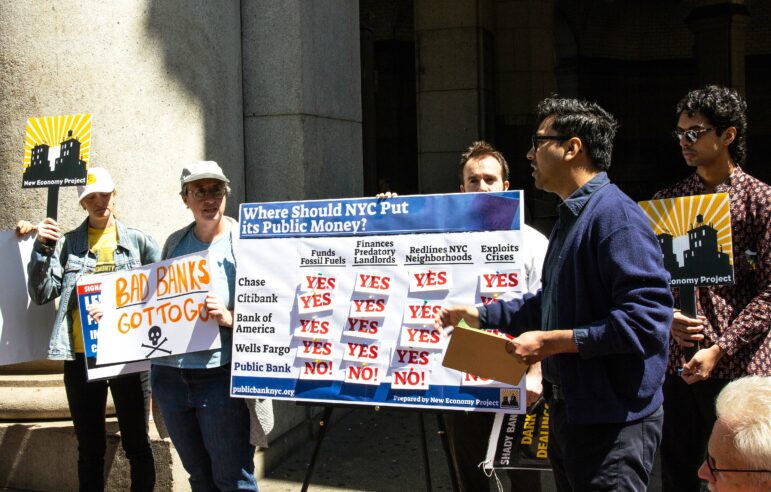

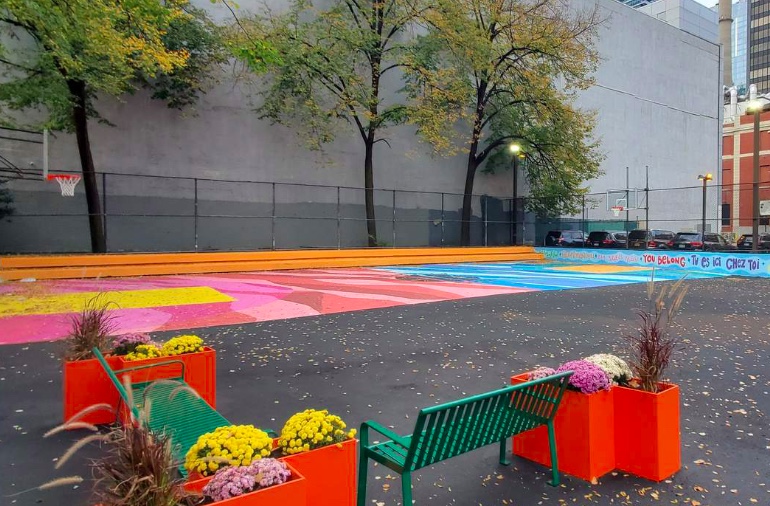
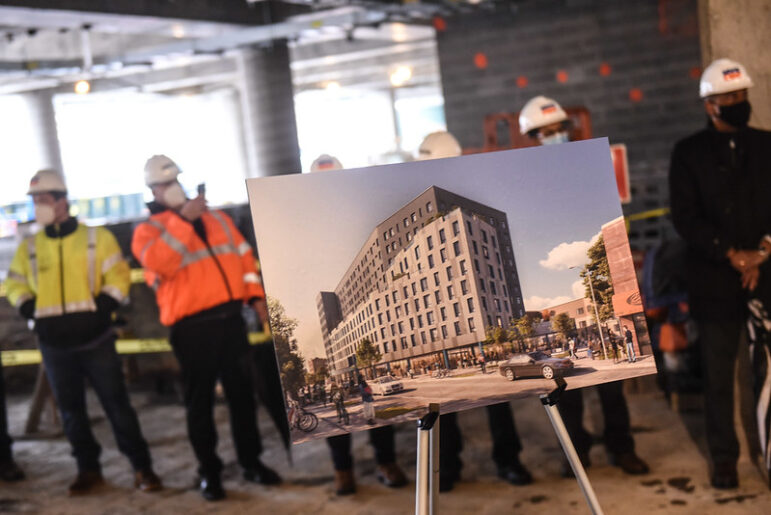
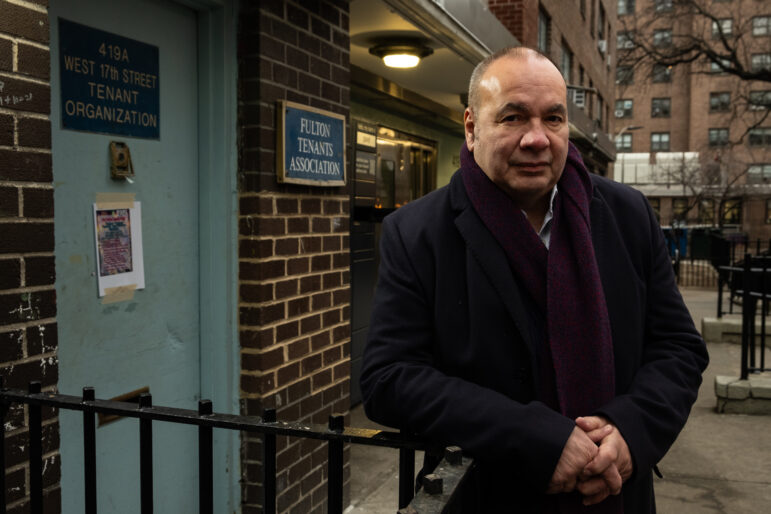


2 thoughts on “Before Bed-Stuy: What de Blasio Actually Said About Cops”
‘ in which a small group of protestors allegedly assaulted some members of the NYPD’
Allegedly?
What about citizen brutality?